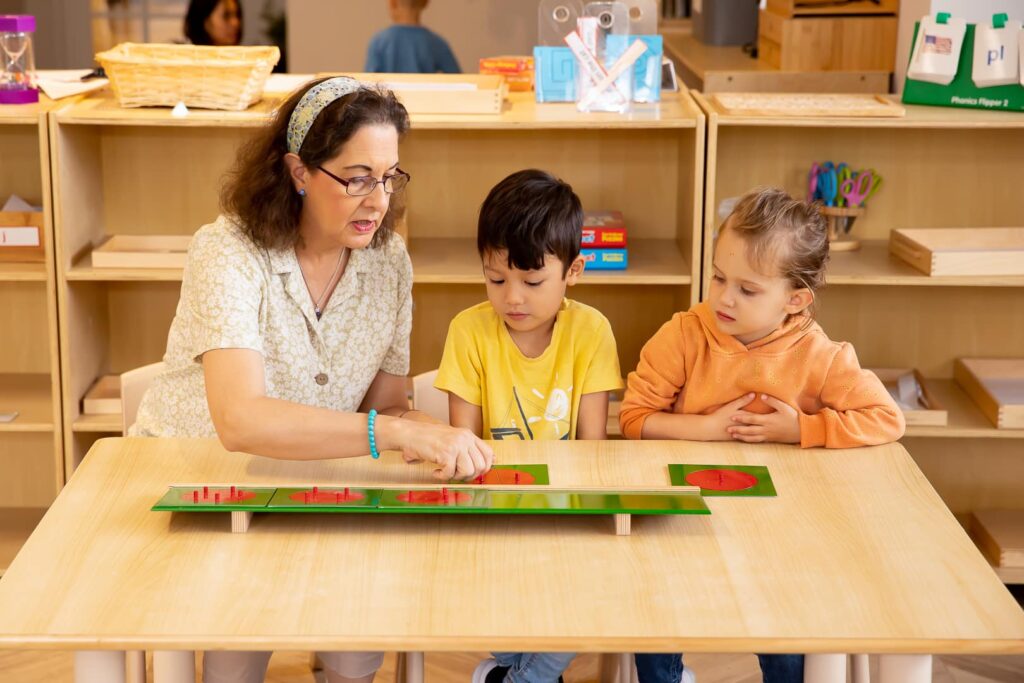
The Child’s Absorbent Mind: Nurturing Early Development and Learning
December 27, 2023
The concept of the Absorbent Mind, as observed by Dr. Maria Montessori, emphasizes the natural progression of a child’s development, from basic movements to complex language acquisition. Unlike explicit teaching, children effortlessly absorb information from their environment, learning to crawl, walk, and talk without formal instruction.
Concept of Child’s Absorbent Mind
Montessori materials are designed with a sensory focus, particularly emphasizing touch. Through hands-on engagement, children explore and learn, supported by built-in error control mechanisms that engage multiple senses in the learning process. Montessori environments are meticulously prepared to foster independent exploration. This setup allows children the freedom to choose activities based on their interests and pace, promoting self-discipline and a sense of autonomy.
The freedom of movement within these environments aligns with the developmental needs of young children, facilitating both physical and cognitive growth. Movement is integral to the absorption of knowledge through the absorbent mind. Children’s incessant “why” questions, while sometimes challenging for parents, reflect their innate curiosity and desire to learn. Rather than overwhelming them with complex details, providing simple explanations and encouraging hands-on experiences aligns with their developmental stage. Parents should resist the temptation to push advanced concepts onto very young children, as it may lead to rote memorization without true understanding. As children approach six years old, they become more receptive to detailed explanations and scientific concepts.
While social media may showcase early achievements, the emphasis should be on experiential learning rather than forcing information onto young minds. Every child can absorb knowledge naturally, and fostering their curiosity through exploration is key to healthy development.
The Stages of the Absorbent Mind
In Montessori education, the concept of the “absorbent mind,” coined by Dr. Maria Montessori, describes the unique way young children learn from birth to around six years old. This period is divided into two key stages: the unconscious absorbent mind and the conscious absorbent mind. Understanding these stages is essential for parents and educators to support children’s natural learning processes effectively.
1. Unconscious Absorbent Mind (Birth to Age 3)
During the first stage of the absorbent mind, from birth to approximately three years old, children learn unconsciously. This phase is characterized by an incredible capacity to absorb information effortlessly from the environment. Like sponges, infants and toddlers soak in every experience, sound, language, and cultural practice. Their minds are impressionable and are most receptive to sensory input.
- Language Development: Babies begin to understand and eventually speak their native language by listening to the conversations around them. They don’t need explicit instruction; exposure alone does the work.
- Movement and Coordination: During this stage, children also learn to crawl, walk, and coordinate their movements. The physical environment becomes a crucial teacher, helping them develop these skills naturally.
- Formation of the Self: Social interactions and observing their surroundings aid in forming their sense of identity and understanding of the world. These experiences lay the foundation for future learning and behavior patterns.
2. Conscious Absorbent Mind (Ages 3 to 6)
Around age three, children enter the second stage, the conscious absorbent mind. Here, they become more aware of their learning and begin to actively engage in activities that pique their curiosity. While their minds are still highly receptive, they start making intentional choices about what to learn and how to interact with their surroundings.
- Purposeful Exploration: In this phase, children exhibit a desire to explore and experiment with materials and concepts. They are eager to learn through hands-on experiences, which help them internalize and understand abstract ideas.
- Refining Skills: Fine and gross motor skills are honed as children engage in tasks like writing, drawing, and working with Montessori materials. These activities are crucial for building concentration and independence.
- Development of Social Awareness: Social interactions become more complex as children begin to understand concepts of sharing, empathy, and cooperation. They develop stronger connections with peers and learn how to function within a community.
Supporting the Absorbent Mind
Recognizing the significance of these stages means providing children with environments rich in sensory experiences, language opportunities, and activities that encourage exploration and discovery. Montessori schools are designed to cater to the absorbent mind, offering materials and experiences that align with children’s natural developmental needs.
By understanding and respecting the absorbent mind, parents and educators can create nurturing environments that foster a lifelong love of learning and personal growth.


